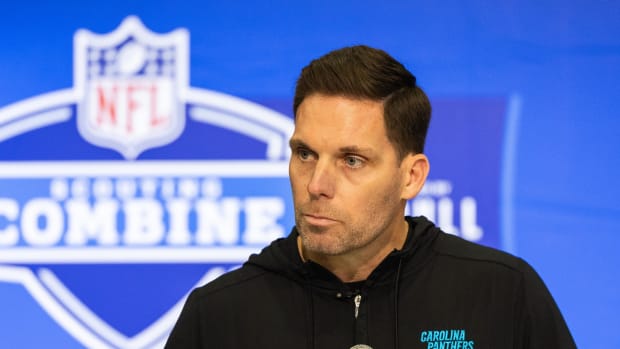Welcome to the NFL offseason, where receivers get paid lots of money (just ask Justin Jefferson, A.J. Brown, DeVonta Smith, Amon-Ra St. Brown, Jaylen Waddle and Nico Collins), the NFL continues to push for an 18-game season, the league and NFLPA discuss ways to ruin the offseason calendar and teams continue to go through their OTAs and mandatory minicamps.
So we asked our MMQB staff of NFL experts to answer a series of eight questions. Today, they’re going to weigh in on the general managers who have had the biggest impact this offseason.
Let’s get to their answers as we get closer to the NFL taking a break before July training camps.
Matt Verderame: Dan Morgan, Carolina Panthers
Morgan is saddled with the responsibility of trying to resurrect a franchise which went a league-worst 2–15 last season. He’s also charged with trying to placate owner David Tepper.
Yet this offseason seemed like a positive step for the Panthers due to Morgan’s aggressiveness in free agency. Carolina didn’t have its first-round pick, but still added a host of talent including edge rushers D.J. Wonnum and Jadeveon Clowney, linebacker Josey Jewell, receiver Diontae Johnson, guards Robert Hunt and Damien Lewis, corner Dane Jackson and defensive tackle A’Shawn Robinson among others.
If second-year quarterback Bryce Young doesn’t improve, none of Morgan’s moves are going to amount to much. But if Young can take a big step under new coach Dave Canales, the Panthers are positioned to be a much tougher out.
Gilberto Manzano: Adam Peters, Washington Commanders
It has to be Peters for quickly transforming one of the worst rosters in the NFL into one that could compete for the postseason in 2024.
Obviously, it helped that Peters had the No. 2 pick to draft quarterback Jayden Daniels and spark the rebuild in Washington. But Peters managed to form a compelling defense for new coach Dan Quinn. Also, hiring a proven coach such as Quinn was a major get for Peters and a franchise that probably needed an experienced head coach for this new era.
Peters, the former San Francisco 49ers front office executive, spent plenty of money in free agency, but did it wisely to maintain cap space flexibility for the future. He bet on underrated players such as edge rusher Dorance Armstrong and linebacker Frankie Luvu, and he also retooled the offensive line for Daniels.
Conor Orr: Joe Hortiz, Los Angeles Chargers
It used to be that Baltimore Ravens personnel folks didn’t leave the house, even after Eric DeCosta succeeded the great Ozzie Newsome. However, we’ve seen recent success stories such as Joe Douglas in New York, who was a Baltimore and Philadelphia Eagles disciple, nailing both Sauce Gardner and Garrett Wilson in one draft. Now we have Hortiz, who has been the team’s personnel director since 2019. This is as strong an ideological marriage as any coach and GM tandem I’ve seen this offseason and the Chargers already have a roster that will be fun to play around with and build. Hortiz’s job, to toughen up the place around Justin Herbert, won’t be easy.
Albert Breer: Hortiz
The reason I’m going with Hortiz is something I remember saying to his old boss, DeCosta, about how the Ravens operate—you could explain most of their moves to an 8-year-old. It’s a compliment. It means they operate with a certain level of logic, and Hortiz, and Jim Harbaugh, have done that this offseason.
Where they’ve invested in talent tells that story. Coming into the offseason, they had a messy cap situation with four veteran players—Keenan Allen, Mike Williams, Joey Bosa and Khalil Mack—needing to be dealt with contractually. So what did they do? They leaned into Harbaugh’s line-heavy ethos, reworking the deals for Bosa and Mack, trading Allen and releasing Williams.
From there, they signed two warhorse tailbacks, in J.K. Dobbins and Gus Edwards, who’d need no adaptation to the Harbaugh style of play (having been in it in Baltimore), then doubled down in the draft, selecting Notre Dame tackle Joe Alt over replacing Williams and Allen with a Malik Nabers or Rome Odunze. Then, they turned around and took Ladd McConkey in the second round to address a need at receiver.
Easy to explain, right? So logical, a kid would get it.
